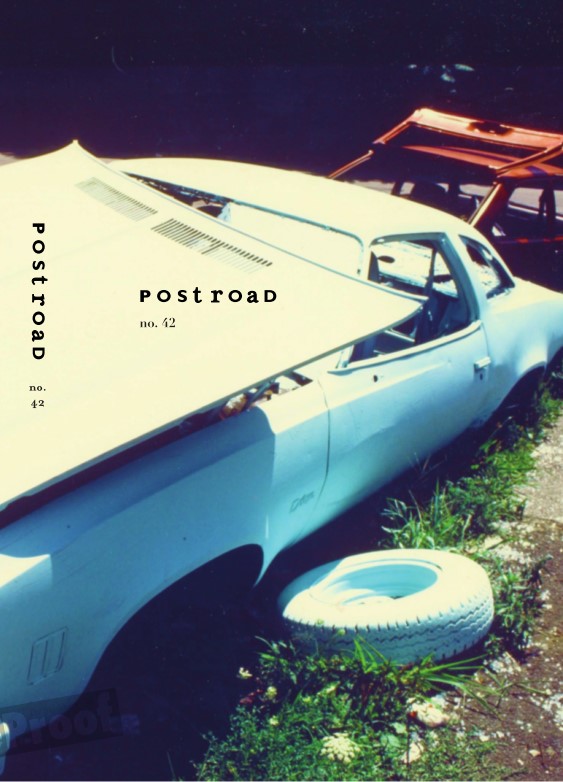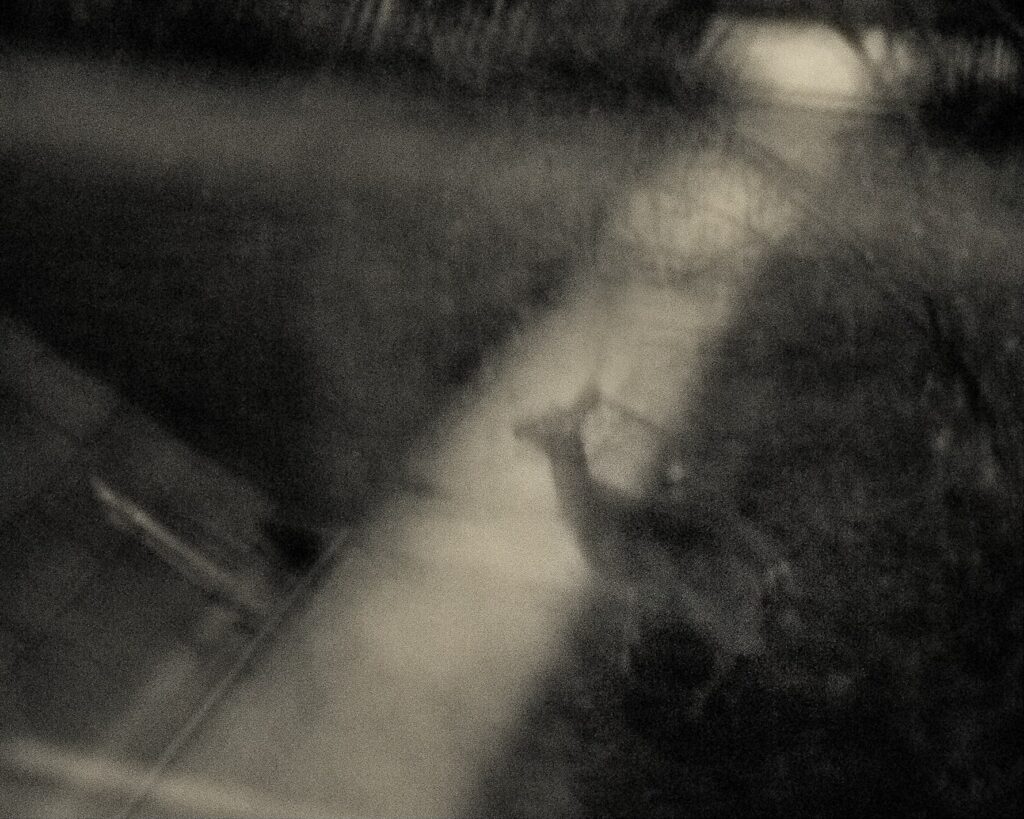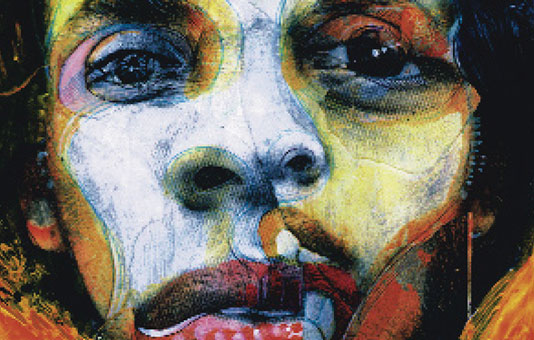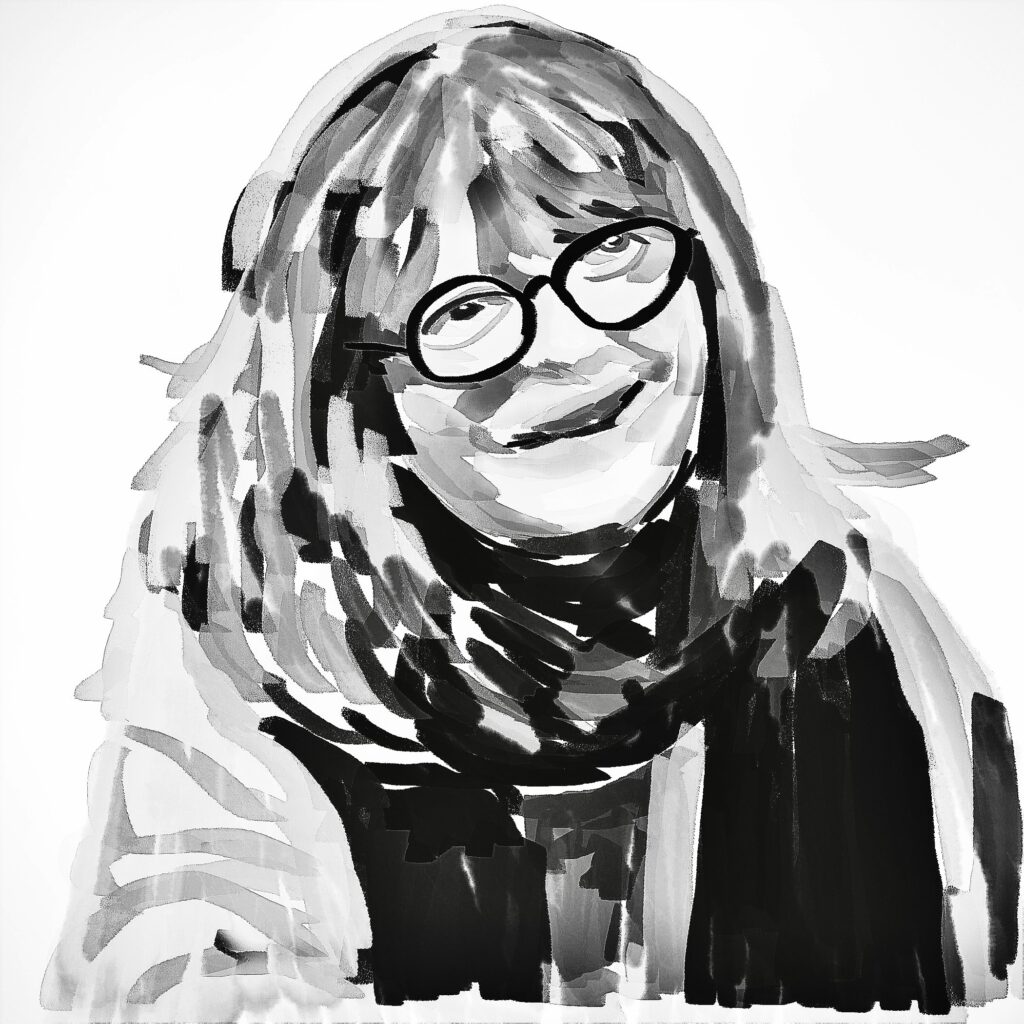a good man, a sorry man, a bad man
by Ashton Politanoff
My wife was still at work. My son didn’t want to go to the park, but I needed to get outside. He had a fever, so I gave him a glass full of ice cubes and told him to suck on them during the drive. His school wouldn’t take him back until the fever was gone. I drove in a direction until we found a park. The park was one we hadn’t been to. The grass around the playground was tall, uncut, and I followed him down the concrete path. The sky was orange, with only a few clouds as the sun set in the distance. A girl was on the swings. She was self-sufficient, tucking her legs behind her and straightening them forward, building momentum. My son was not self-sufficient. He still needed me to push him. The swing the girl was on was silent on the way up, but it sounded like a bird’s chirp on the way down. It was rusty. The girl was alone. My son climbed some steps leading to a red slide, and I took a seat on a wooden bench with chipped green paint. Directly across from me, behind the playground, were two tennis courts. They looked slick and worn from use, and the nets sagged down the middle. On one side of the nearest court was a young man, a towhead, my guess would be eighteen, and on the other side was an older man, presumably his father. The young man took his racket back for a forehand with a quick shoulder turn, all the time in the world, his feet making tiny little squeaks as he moved. He sent the yellow ball in a clean arc deep to the other side of the court. The father with the sport sunglasses was competent. The rally continued. The constant percussion of the ball being struck with trained perfection by the young man sent a vibration through me. I could feel it inside of me. I found myself walking toward the fence, the sound of the ball, the flick of the wrist, feet stepping forward like daggers, then tumbling back like leaves, the ball hailing and then collapsing missile-like onto the hard court. Then, I heard a cry behind me. It was my son.
I put a Band-Aid on his knee in the bathroom and then turned on the TV. In the kitchen, I peeled the skin of a pear with a potato peeler. Then, I sliced it with a large knife.
I want a peach, he said when I handed him the small rectangular Tupperware holding the fruit.
We don’t have any peaches in this house, I said, walking away.
Where are you going, Dad?
In the garage.
Why?
I’m looking for something.
But I’m scared, he said to me.
Be brave, I said. I held out his blue eiderdown, the one he would disappear under.
In the garage, there wasn’t a kept car. There was a dining table with broken legs, toys my son had outgrown, electronics that no longer worked. I found my old Slazenger somewhere in the back. The overgrip was denim blue, faded and feathered. It felt soft and innocent in my hands. I heard my son calling me. I squeezed it hard. I started swinging, cutting the still air in the garage—whoosh! Forehand, backhand, forehand, backhand. My son. I kept swinging.
When I was ten, I had trouble sleeping the night before a tournament. When I closed my eyes, I saw it. It had girth to it, and my nose would be right up against its shiny underside. I could see the scales. It was taller than me, hovering above me, standing upright, and I would watch something swallowed, something oversized, sink its way down its belly. One time I saw a hand, another time a head—the mold of a face frozen in a silent scream—being consumed, making its descent in the body of this thing.
I didn’t want to close my eyes.
I haven’t seen the snake for a while.
This way, I said, guiding with a flat hand. I could feel his bony shoulder blade under his T-shirt. I put on his backpack for him at the gate of the school. Have a great day.
My son is blond, blue-eyed, fair skinned. I have brown hair, light brown eyes, and I could be described as swarthy. My wife, she is blonde and green-eyed, and although she tans easily, she looks Irish. Sometimes people ask me if my son is my son when I’m with him alone. When I tell them yes, they ask me again as if I’ve misunderstood the question. Don’t they see his chin? my wife says to me. He has your chin, she tells me.
I got back in the car. I had an appointment.
At the entrance of the club, the fountain spat limply. Inside, behind the front desk sat a young woman with a waterfall of shiny black hair. She was wearing a forest-green crewneck sweatshirt with Wind & Sea Tennis Club printed on it.
Good morning, she said. How can I help you?
There were columns on either side of the desk, and a large bowl of flowers behind her. The flowers were stiff, fake. As soon as the name Ken left my lips, a man appeared from behind one of the columns as if he was waiting for me. He was tall and thin and red from the sun and he had thinning brown hair. I noticed the white door of the side office next to the front desk. The door blended in with the wall, and even the knob was painted white, a detail I found tacky. They were trying to hide this office. He shook my hand firmly, and had I had the opportunity, I would have washed it due to the sweat of his grip. He had his other arm in a sling. I asked him what happened. Elbow surgery, he said. Had he had a black eye, I would have been suspicious of this answer.
Ken led the way. We weaved around the twenty-two courts and the groomed grounds. There was a gym, a lap pool, a kiddie pool. There was a bar and lounge, locker rooms with sauna and steam. There was the pro shop where rackets were strung. There was a balcony with seating that overlooked the club, a gazebo for weddings. In fact, not much had changed.
When’s the last time you played tennis? he asked by the jacuzzi. The water had a green hue to it.
Fourteen years, I said.
Back in his office, Ken took a bite of his Long John donut, wrote some numbers on a legal pad, and then ripped out the sheet. The yellow custard inside the Long John oozed out onto a white napkin. I folded the piece of paper into my pocket and told him I’d let him know.
On the way out, I had to use the bathroom, and the urinals were wall-installed at a rather high height, as if made for giants. They made me feel like a small man.
For a time, the club was under a shroud. There were some incidences of disappearances, and the first involved a love triangle. A former tennis star, Larry Schiffer, was married to a Mrs. Schiffer. They were separated, but they both played tennis at the club. Larry more often than not could be found upstairs at the bar while his wife played tennis with their family doctor, a bachelor. Mrs. Schiffer wanted a divorce, but Larry did not. He did not want a legal separation—only that they eventually live apart. One night, after playing in a mixer together, Mrs. Schiffer and the good doctor went to his medical office to x-ray her ankle—she had given it an accidental twist on the court just prior. After careful examination, he wrapped it for her in a support wrap—the ankle was fine—and they proceeded to the gated community he lived in and played more tennis under the lights, followed by cocktails at the pool. She didn’t leave his place until 1 a.m. The next day, the good doctor didn’t hear from her and he grew concerned, so he drove to her home, the one she still shared with Larry. When he arrived, her car was parked in the driveway. Inside the house she was found painting her toenails near the freestanding tub. That’s why she couldn’t hear the phone. She had been in there for a while. Where’s Larry? There was no sign of Larry. A week later, Larry’s car was found abandoned at the edge of a hiking trail, and a murder inquiry was opened. A shallow grave was found at the Schiffer home only to reveal the bones of a dead dog. There was no further evidence and the case remains unsolved.
The second incident involved a set of twins and the club stringer. The stringer was obsessed with natural gut. One day, the twins had observed the negligent disposal of chemical waste when the club was under different management. There were drums of toxic chemicals being poured out into the gutter of the parking lot. The twins weren’t the only ones to make this discovery. The club stringer also discovered these drums before maintenance had disposed of all of them. A few members had disappeared—a teacher, a minister who liked to swim early in the mornings, and the owner of several local knitting mills. The chemicals were lethal, and this stringer smuggled a couple drums and used them for the concealment of murder. He lured the victims to his home. He was convinced that natural gut coming from a human rather than an animal would have optimal performance as a string bed in a racket. It is said that he strung one of Ivan Lendl’s rackets, the one he won Wimbledon with, with this very set of strings. The stringer disposed of the body parts he didn’t need in these lethal chemical tubs, and he was eventually discovered as a murderer. The club naturally tried to cover their tracks and the twins only caught them in the act. Nothing happened to the twins.
When I picked up my son from the after-school program, the light was dying in the west with a sheet of dark clouds encroaching from the east. The field and playground looked doomed in the strange glow. It looked like the end of something. My son’s fingernails were long and caked underneath with dirt. They needed cleaning. They needed cutting. I strapped him into his seat and put the car in reverse.
I really want a toy, Dad, he said.
Dad, he said.
What.
Can we get a toy from Target?
No.
You promised.
I didn’t answer. A few heavy drops of rain splattered against the windshield, thudded against the roof. My son, he began to cry.
There was a parking structure underneath the Target, but I parked outside.
I’m getting wet, Dad, he said outside the car. I made a roof over his forehead with my hand.
Inside, my son led the way. The floors looked like a hospital’s. I followed him to the toy section, and we started in the Lego aisle. He pointed at some things.
Too expensive, I said.
Next was the action figure aisle and then the puzzle and board game aisle. He didn’t point at anything this time. We returned to the Legos. I told him the budget was twenty dollars.
Dad, this Target doesn’t have anything I like. Can we go to another Target?
The other Target is closed.
No it isn’t.
Yes it is, I said.
You’re lying.
They’re remodeling.
I want to go to another Target!
No.
My son, he sat on the ground. He began to whimper, and a store employee, a woman in a Target team shirt appeared.
Can I help you? Is everything okay?
Yes, we’re fine, I said. Thank you—but the woman, she remained. She took a few lingering steps, looking at me, looking at my son, looking at me again.
I’ll pretend you’re not my father again, my son whispered.
Don’t you dare.
Then get me that! he said pointing at a Lego box, a shipwreck and island set that cost $79.99.
I shook my head.
I want my mom and dad!
Stop it right now.
I glanced down the aisle and the woman was still there. I had no choice but to pick him up.
Put me down! You’re not my real dad! I draped him over my shoulder and headed for the exit. The employee, she was on her walkie-talkie. She said something I couldn’t make out as she trailed behind, and there were lines of people in the front with baskets and carts, waiting to check out. The sky was black outside. My son was screaming.
It wasn’t until I made a right onto Artesia that I noticed the cop car behind me. I told my son to calm down. I told him the police were here.
You’re going to jail! he said. The squad car strobed its lights, let out its little tune, and I did as I was commanded.
The rain was coming down now, and I turned off the windshield wiper. The windshield bled red from the stoplight, from the massage parlor neon, and I lowered my window where I met the eye of a flashlight.
Driver’s license and registration please.
I reached into the glove box and handed over the documents, including a copy of my son’s passport.
I assume you think this is an attempted kidnapping? The officer didn’t respond.
This has happened before, I added. It’s his way of bribing me to get what he wants. My wife and I are working on it.
The officer was blond and blue-eyed. He could have been the father.
I don’t want my dad to go to jail.
The officer studied my license, then me, then my son. A big truck rushed past, and I could feel its draft.
When we got home, all the lights were off, the house empty. From the freezer I removed a package of mac ’n’ cheese. I punctured the plastic cover several times with the tip of a small knife before zapping the whole thing in the microwave.
Ashton Politanoff is the author of You’ll Like it Here, published by Dalkey Archive. He is a frequent contributor to NOON.





